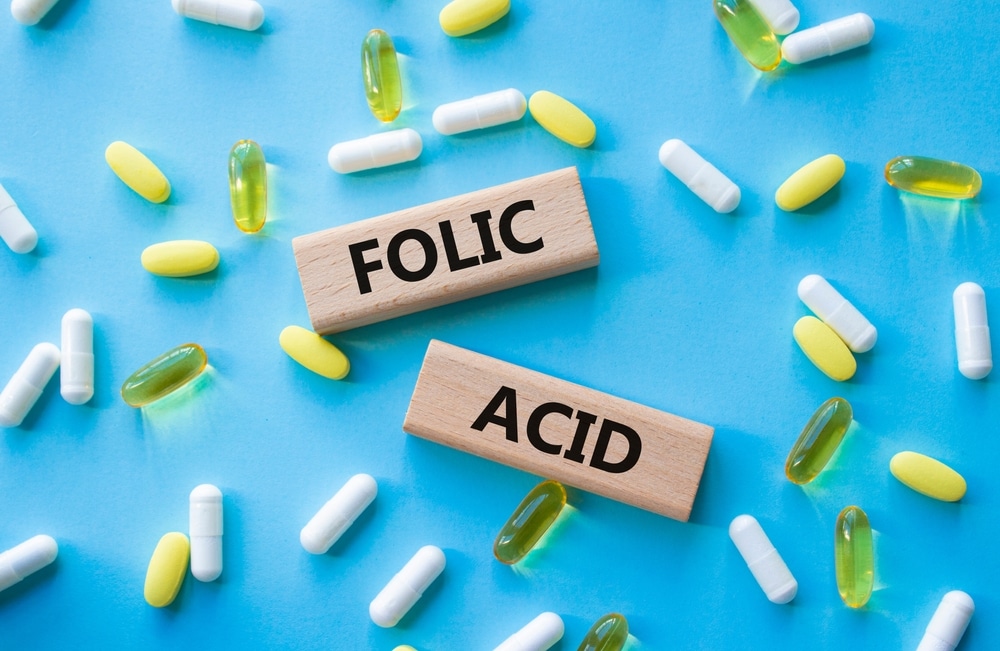If you consume a daily vitamin B complex, you’re likely familiar with the numerous advantages that B vitamins offer for your health. One such essential vitamin is folate (also known as B9), which plays a crucial role in the production of DNA, RNA, and red blood cells—making it especially important during pregnancy for the development of your baby.
While most individuals obtain sufficient folate from foods such as dark leafy greens, beans, and nuts, it is often added to various food products and available as a supplement known as folic acid. This form of folate is more easily absorbed by your body and is frequently recommended for those with low folate levels.
Regardless of how you obtain this vitamin, ensuring you have adequate amounts is essential for optimal health. Experts outline the numerous health benefits of folic acid, advise who should consider supplements, and who can rely solely on food sources for folate.
How much folic acid should you consume daily?
According to the National Institutes of Health (NIH), the recommended daily intake for the average adult is 400 micrograms DFE (dietary folate equivalent) or 240 micrograms of folic acid from supplements and fortified foods.
Tip: DFE accounts for the greater absorption rate of folic acid compared to naturally occurring folate in food. For context, 1 microgram of folate from food is similar to 0.6 micrograms of folic acid from supplements and fortified items.
Five health benefits of folic acid
1. It may prevent birth defects during pregnancy
During pregnancy, folic acid is essential for the proper development of your baby’s neural tube, which ultimately forms the brain and spine.
“Folic acid supports nucleotide production,” which serve as the foundational components of RNA and DNA, explains William Li, MD, author of Eat to Beat Your Diet: Burn Fat, Heal Your Metabolism, and Live Longer. These nucleotides are critical in forming the central nervous system in a fetus, he continues.
As a result, ensuring adequate folic acid intake is vital in preventing major birth defects known as neural tube defects (NTDs), affecting the brain and spine, according to Stephanie Hack, MD, FACOG, a board-certified OB/GYN and founder of Lady Parts Doctor. Significant medical issues can arise from neural tube defects, including:
- Cleft palate (a split in the roof of the mouth due to incomplete tissue joining)
- Spina bifida (a condition impacting the spine that may result in physical or intellectual challenges)
- Brain damage
So, how much folic acid should you consume if you’re pregnant or planning to conceive? “The CDC advises a daily intake of around 400 micrograms of folic acid (or 600 micrograms DFE) to aid in the prevention of birth defects,” Dr. Hack states.
Consuming foods rich in natural folate can also help you reach the required levels during pregnancy. Many breads, pastas, and cereals are fortified with folic acid, making them helpful additions to your diet.
However, obtaining 400 micrograms of folate from food sources alone can be challenging. This is where prenatal vitamins prove beneficial, as they contain the appropriate amount of folic acid for expectant individuals. If you are considering pregnancy, it’s advisable to start a folic acid supplement 12 weeks prior to conception, says Dr. Hack, as neural tube defects typically occur early in pregnancy, sometimes even before one is aware of the pregnancy.
“The CDC recommends taking about 400 micrograms of folic acid (or 600 DFE) every day to prevent birth defects.”—Stephanie Hack, MD, OB/GYN
2. It can address a folate deficiency
Although many people receive enough folate (especially in countries like the U.S. where many cereals and pasta products are fortified with folic acid), some groups remain at risk for folate deficiency.
Individuals struggling with alcohol use disorder, inflammatory bowel disease (IBD), and celiac disease often experience lower folate levels, as highlighted by Mount Sinai. These conditions impair the body’s capacity to absorb specific nutrients and vitamins.
Additionally, individuals with an MTHFR gene variant may be at a heightened risk for folate deficiency. This gene plays a key role in producing the MTHFR protein, essential for folate absorption, as noted by the National Library of Medicine. A mutation in this gene can hinder the body’s ability to process folate effectively.
Certain medications may also lead to reduced levels of folic acid. Some examples of medications that may interfere with folate absorption include:
- Antacids for heartburn treatment
- H2 blockers, such as cimetidine (Tagamet), famotidine (Pepcid), and ranitidine
- Proton pump inhibitors that are used to decrease gastric acid, including esomeprazole (Nexium), lansoprazole (Prevacid), omeprazole (Prilosec), and rabeprazole (Aciphex)
- Bile acid sequestrants, which are utilized to lower cholesterol levels, such as colestipol (Colestid), cholestyramine (Questran), and colesevelam (Welchol)
- Anti-seizure medications, including phenobarbital, primidone (Mysoline), and carbamazepine (Tegretol)
- Nonsteroidal anti-inflammatory drugs (NSAIDs), like ibuprofen (Advil, Motrin) and naproxen (Aleve)
- Sulfasalazine (Azulfidine), aimed at treating inflammatory bowel disease (IBD) and rheumatoid arthritis (RA)
- Triamterene (Dyrenium), a diuretic
- Cycloserine, an antibiotic
- Pyrimethamine (Daraprim), used for malaria prevention and treatment as well as toxoplasmosis
- Trimethoprim, an antibiotic employed to manage urinary tract infections and other infections
What are the signs of folic acid deficiency?
A deficiency in folic acid can manifest in various health issues. Fatigue is commonly one of the initial signs, as noted by the Cleveland Clinic. Mount Sinai outlines several other potential effects of folic acid deficiency:
- Poor growth in infants and children
- Inflammation of the tongue
- Gingivitis
- Loss of appetite
- Shortness of breath
- Diarrhea
- Irritability
- Memory issues
- Mental sluggishness
3. It promotes heart health
Folic acid is essential for maintaining heart health. “It assists your body in metabolizing an amino acid known as homocysteine,” explains Dr. Li. Elevated levels of homocysteine can harm the endothelium, the delicate lining of your blood vessels, potentially leading to obstructions and severe heart-related issues like stroke, according to Dr. Li.
Although there is no definitive proof that increased homocysteine levels directly result in heart disease, studies suggest that individuals with high homocysteine concentrations are over twice as likely to experience a stroke compared to those with normal levels and are at a greater risk of developing heart disease overall, per Mount Sinai.
Importantly, folate plays a critical role in the proper functioning of red blood cells. A lack of this vitamin can lead to folate deficiency anemia, which may pose various complications, including cardiovascular problems, according to the Cleveland Clinic.
In summary, ensuring adequate folic acid intake is a wise choice for reducing harmful homocysteine levels and safeguarding your heart. Aim to include folic-acid rich foods in your diet, and if you have a history of heart issues, consider discussing with your doctor the possibility of taking a vitamin B supplement.
4. It might help lower cancer risk
Consuming a diet rich in folic acid may provide protective benefits against certain cancers, such as those of the stomach, breast, cervix, pancreas, and colon, according to Mount Sinai.
Conversely, low levels of folate in the body are linked to a heightened risk of cancer, as stated by Dr. Li, referencing a review from August 2018 in Current Nutrition Reports.
While the exact mechanism behind folic acid’s anti-cancer properties remains unclear, some experts believe it may be related to folate’s role in the accurate synthesis of DNA, as indicated by Dr. Li. DNA serves as the fundamental “genetic blueprint” necessary for the proper development and functioning of your body. Errors in DNA synthesis can lead to mutations and, potentially, cancer.
That said, evidence confirming that folic acid supplements can prevent cancer is still lacking, according to Mount Sinai. To effectively lower your cancer risk and enhance overall health, focus on maintaining a balanced diet filled with folic acid-rich foods and consult your physician for appropriate cancer screenings based on age, family history, and existing health conditions.
5. It may alleviate depression
As per the NIH, individuals with diminished blood levels of folate are more likely to experience depression. A meta-analysis published in December 2017 in the Journal of Psychiatric Research found that individuals suffering from depression tend to have lower folate levels compared to those without depressive symptoms. This can impact treatment efficacy, as individuals with lower folate may not respond as effectively to antidepressants than those with adequate levels, per the NIH.
This highlights that sufficient folate may support mental health and diminish depression symptoms, including suicidal tendencies. A large September 2022 study in JAMA Psychiatry revealed that taking 1 milligram of folic acid daily (considered the upper tolerable limit for adults) was related to lower incidences of suicide and self-harm attempts among over 850,000 participants.
While these findings are encouraging, the relationship between folic acid and depression is not entirely understood. For instance, it remains unclear if a reduced appetite (a common symptom of depression) leads to folate deficiency or if folate deficiency contributes to depression, as noted by Dr. Hack.
Researchers have developed some initial hypotheses concerning this connection. One possibility is that “folic acid is essential for brain function in producing neurotransmitters like serotonin and dopamine,” explains Dr. Li. Since both serotonin and dopamine are vital to mood regulation, boosting their levels may alleviate depression symptoms, he points out.
However, other research has indicated that folic acid supplements may be no more effective than a placebo regarding depression relief, according to Mount Sinai.
In conclusion, while folic acid supplements might not ensure improvement in depressive symptoms, consult your doctor before starting any supplementation. If they approve, include it in your treatment regimen alongside established therapies and medications.
Dietary sources of folic acid
For the majority of adults (excluding those who are pregnant or trying to conceive), obtaining all necessary folate from whole foods is advisable. Fortunately, many foods are inherently rich in folate or are fortified with folic acid, making it likely that a balanced diet will provide sufficient amounts.
Foods high in folate include, according to the National Institutes of Health (NIH):
- Beef liver
- Vegetables such as asparagus, Brussels sprouts, and dark leafy greens like spinach and mustard greens
- Citrus fruits and their juices, particularly oranges and orange juice
- Legumes and nuts, including peanuts, black-eyed peas, and kidney beans
According to the NIH, folic acid is additionally included in these products:
- Enriched bread, flour, cornmeal, pasta, and rice
- Fortified breakfast cereals
- Fortified corn masa flour, which is commonly used in making corn tortillas and tamales
Who should consider folic acid supplements?
While most individuals can obtain sufficient folic acid through their diets, certain groups may find it beneficial to take supplements.
- Pregnant individuals or those contemplating pregnancy: Begin taking prenatal vitamins with folic acid three months prior to conception, aiming for 400 micrograms daily, advises Dr. Hack. If you are at increased risk for neural tube defects (due to a seizure disorder or previous pregnancies with defects), a daily intake of 4,000 micrograms is advised; however, be sure to consult your healthcare provider regarding appropriate dosing.
- Individuals with elevated homocysteine levels: If your blood tests reveal high homocysteine levels, a folic acid supplement could potentially reduce your likelihood of heart issues and help to normalize those levels. In this case, Dr. Li recommends a dosage of 400 micrograms.
- People vulnerable to folate deficiency: This includes individuals suffering from alcohol dependency, severe malnutrition, inflammatory bowel conditions, celiac disease, or those with the MTHFR gene mutation, according to Dr. Hack.
- Individuals experiencing depression: If your healthcare provider agrees, taking a folic acid supplement along with other therapies, such as antidepressants and lifestyle modifications, may help alleviate symptoms. Nevertheless, Dr. Li notes that research is still unclear on the exact amount of folic acid needed for this purpose.
Regardless of your circumstances, it’s crucial to consult with your physician before starting any new supplement, as interactions with other medications or potential side effects can occur. Your doctor can assist in determining the appropriate dosage for your needs.
Who should avoid folic acid supplements?
For some individuals, taking a folic acid supplement may pose more risks than benefits. Exercise caution if you belong to any of the following groups, and always seek advice from your healthcare provider prior to initiating any new supplement:
- Individuals allergic to folic acid: Though rare, folic acid allergies can occur. Symptoms of an allergic reaction may include skin rashes, itching, redness, and in severe cases, difficulty breathing, as noted by the Mayo Clinic. If you experience any of these signs after taking a supplement, discontinue use and consult your doctor promptly.
- Individuals on specific medications: Folic acid can sometimes reduce the efficacy of certain drugs. For instance, those taking Dilantin (phenytoin) for seizures should consult their doctor before starting folic acid, as it may lower the concentration of the medication in the bloodstream. This caution extends to other anti-seizure medications like fosphenytoin (Cerebyx) and primidone (Mysoline), per the Mayo Clinic. Additionally, folic acid can interfere with some cancer treatments, potentially diminishing their effectiveness, according to Mount Sinai, and may also reduce the impact of certain barbiturates and the anti-malarial drug pyrimethamine (Daraprim), as outlined by the Mayo Clinic.
Can you take too much folic acid?
Folic acid is typically safe when taken at the advised daily level. However, exceeding 1,000 micrograms daily, which is the upper limit, can lead to negative side effects. Although it is uncommon, high doses of folic acid might result in:
- Gastrointestinal issues
- Sleep disturbances
- Skin reactions
- Confusion
- Decreased appetite
- Nausea
- In extreme situations, seizures
“Excessive folic acid intake can also mask the symptoms of vitamin B12 deficiency,” warns Dr. Hack. A prolonged deficiency of vitamin B12 could be dangerous, leading to irreversible harm to the brain, spinal cord, and nerves, according to the NIH.
To mitigate this risk, it’s often advised to take a supplement that contains 100% of the daily value for both folic acid and vitamin B12, as per the Mayo Clinic.
For safety, always consult your physician before exceeding 800 micrograms of folic acid.
Image Source: Natalya Bardushka / Shutterstock

































